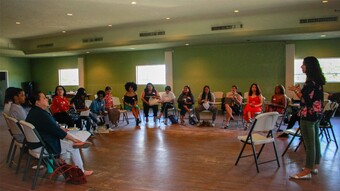The Good, the Bad, and the Kickstarter
An Interview with Jason Tucker
Jason Tucker had been directing across the country for years when he was hired as Artistic Director for Street Theatre in Nashville. He took over the position in January of this year. I sat down with him to find out what that transition has been like so far.
Amanda Elend: How did you get the job as Artistic Director for Street Theatre Company?
Jason Tucker: I was really lucky. The outgoing AD is also the founder. She’d been struggling for ten years to build something and she was pretty tired. It would have been very easy for her just to drop it, and she tells me she genuinely was considering exactly that. But she’d also been keeping an eye out for someone who might be able to take over. After I worked for her as a director a couple of times, she ran the idea by me. She imagined I’d laugh. She had no idea it was something I’d essentially been preparing for.
Amanda: How were you preparing for it?
Jason: Right before I was hired at Street, I was actually putting together plans to start my own theatre. I had a lot of things in the works such as fundraising, taxes, budgets, location scouting, etc.
Amanda: What was the first surprise when you took the job?
Jason: How little the theatre actually has in terms of assets and resources. The founder had seemingly been holding the theatre together with bailing wire and chewing gum.
Amanda: How is being an AD different than directing?
Jason: Well, I’ve been working diligently for months and I haven’t directed a damn thing! Being an AD is about shaping a company and its vision and future. Occasionally, I’ll direct some shows, but essentially my job is administration and leadership for the company as a whole.
Amanda: What has been the hardest part about the transition from director to AD?
Jason: Raising money. And knowing that it will apparently never be enough. As a director, I get to focus on a single story and on how best to tell that. It’s eights parts creativity to two parts admin. Being an AD seems to be almost the opposite. Learning to find joy and contentment in the mundane admin is the hardest part.
Amanda: What is your first season as AD and how did you choose it?
Jason: We’re opening In the Heights soon. Then we have Assassins, Urinetown, and Big: The Musical. In choosing the season, I strove to consider everything a good AD should consider. I really felt like I was proving something with my choices. The shows we do say a lot about who we are, what we think is important, what kind of audience we want, and how we want to fit into our community.

Amanda: So what does this season say?
Jason: This is a season of change. That’s kind of what I’ve subtitled the season. The point of view is that in each of these shows, someone is on the precipice of making a big change, a big decision. The season is about that moment when we have to choose and everything’s going to change.
Amanda: What is it like working with a Board of Directors?
Jason: Challenging and helpful. We’re a small company, so my board is made up of professionals who essentially volunteer time and resources to help us achieve our goals. They’re all lawyers, bankers, marketing directors, and CPAs, so they teach me an awful lot about running a company and working in a corporate structure. But occasionally that kind of thing can feel like an impediment, which is frustrating.
Amanda: You recently did a Kickstarter campaign for Street Theatre. Why did you choose to make that one of your first actions as AD?
Jason: It quickly became apparent that we’d need a shot in the arm to move past this invisible line in our overall progress, which we seemed to have been stuck on for a while. A Kickstarter made sense because I believed I could look to my friends and colleagues from other markets to help this one time if I told them it was important to me.
Convincing people to spend their time and money seeing a story that they may or may not have any experience with is much more difficult. But the more our audience knows who we are, the easier it is to get them to trust us every time we want to tell them a story.
Amanda: You focused the campaign on getting “Street Theatre off the street.” Why?
Jason: The big reason—the philosophical reason that Street Theatre needs a home—is that home is an identity. When we’re homeless and going from venue to venue, first of all, just logistically, an audience consistently has to find us every time. And then secondly, a theatre’s home helps to define a theatre just like a person’s home helps to define a person. The kind of home that we get and the choices we make in that home—simple things, like where we decide to put the stage, how big our lobby is—all of those things help to form a picture of who Street Theatre is. And the reason why that’s important is because buying a ticket to a show is—well, it’s a hard sell. Convincing people to buy a Coke, or convincing people to buy gas, those are easy things to do. Convincing people to spend their time and money seeing a story that they may or may not have any experience with is much more difficult. But the more our audience knows who we are, the easier it is to get them to trust us every time we want to tell them a story.
Amanda: How did you drive success for the campaign?
Jason: With the help of friends and colleagues. The Board of Directors tapped into their friends and family as well. I made sure to be visible on social media every day and to reiterate my goals and my passion. Also, I made sure to publicly thank people so others would feel encouraged to join. And we had a pretty great video to start off with, plus a few more short videos we uploaded throughout the campaign.
Amanda: What is the theatre community like in Nashville? How does it compare to your experience in other cities?
Jason: That’s a question I find myself asking all the time. It’s the audience here that feels significantly different than in other cities. Somehow Nashville’s audience seems to need some remedial theatre appreciation lessons. They love a good show, but sometimes it seems difficult to engage them in the same numbers as similar-sized cities. I’m used to places where the audience came to us more easily. Here we almost have to constantly go out and re-get them for each show.
Amanda: Are you nervous about running a theatre in Nashville?
Jason: I don’t think so. Nashville is basically a Boomtown right now. There’s a massive influx of people, which means money and audience members who will be starting from scratch. If we can grab people now, we can hang on to them for a long time.
Amanda: Where did the name “Street Theatre Company” come from?
Jason: Cathy Street is the founder, so she used her married name. But she also liked the idea of invoking the spirit of street theatre—a type of theatre that is up close and immediate.
Amanda: What is the mission of Street Theatre?
Jason: Street Theatre is committed to bringing quality professional theatre to Nashville. We strive to make theatre that is accessible, low-cost, challenging, and high quality. Part of our mission is to make sure that we provide work for many different kinds of artists at wages that help them continue producing their art.
Amanda: What are your goals for the theatre?
Jason: I’d like Street Theatre to reach the next level of financial stability. I plan to expand the amount of theatre we create each season while gradually raising wages for the artists we employ. And like I said, our immediate goal is to find a home.
Amanda: How do you think Street will change under your direction?
Jason: I think it will become a little more varied in the types of theatre we offer. And I hope to extend our reach in the community by way of bigger audiences, more donors, and a larger and more diverse communal conversation.










Comments
The article is just the start of the conversation—we want to know what you think about this subject, too! HowlRound is a space for knowledge-sharing, and we welcome spirited, thoughtful, and on-topic dialogue. Find our full comments policy here